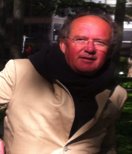Analysis of Algorithms in the Age of Art
Digital poetry is stored, bored in clouds.
Love songs are cooled down to 18°C.
Paintings retire in museums.
811Artists are free and struggle for freedom. With society they negotiate critical and conformist art. In authoritarian regimes creativity, curiosity and courage is reduced to silence.
812 Markets of multi digit dollar sales. Networks promote global recognition. Agents generate the buzz for investors. Galleries hold the keys to big bucks. Collectors merge artistic image with wealth and power.
813Sponsors exploit the noble gloss of art. Platforms produce the image of pluralism for their PR. With artistic creativity feudal patrons brush up risky tech. Artists breath life into cold machines.
814Code complements artists. Autonomous agents are the toys of artistic teams. Intuitive robots support the new contemporary. Block-chain recreates the aura of the original. VR and AI allow innovative formats of surprising art.
815Contemporary art will be replaced. Genius programmers, critical hackers and subversive whistle-blowers are the new artists. Cosmic soundtracks and digital voodoo animations have resigned. Intuitive algorithms substitute artists. Coders are the radical avant-garde.
816Corporate narratives take over. Marketing cultivates myths of creativity. Return on investment turns artists into entertaining finger puppets. Contemporary art is how to become number one.
817We may not call it art anymore. Swarms of self-learning machines produce unique metaphors. Autonomous agents supply unpredictable emotions. Quantum codes deliver innovative contradictions.
Leave the elite loftiness of the eternal.
Listen to the un-computable.
Refrain from
| Scheme | XXX X X X X X X X AAX |
|---|---|
| Poetic Form | |
| Metre | 10010011101 1111111 10010010 1011010110101001010100001010001000101000100010101110 101101010110110010101001101010010111101010101011010 101010111101010110011110100100101011101101101101 110010010010101101010100101010100111001010010010101100110101 0100111110101001000101010101101010100101010101001001010110100011 100100110100101101000110101100101010100100111101101 1111110111110010101100010010010100010101010100010 1001110010 101011 011 |
| Characters | 1,661 |
| Words | 236 |
| Sentences | 36 |
| Stanzas | 9 |
| Stanza Lengths | 3, 1, 1, 1, 1, 1, 1, 1, 3 |
| Lines Amount | 13 |
| Letters per line (avg) | 107 |
| Words per line (avg) | 18 |
| Letters per stanza (avg) | 154 |
| Words per stanza (avg) | 26 |
About this poem
Cue card poetry is an experiment to make relevant technology accessible by artistic intervention.
Font size:
Written on April 06, 2021
Submitted by bob.kastner on July 12, 2021
Modified on March 05, 2023
- 1:10 min read
- 21 Views
Citation
Use the citation below to add this poem analysis to your bibliography:
Style:MLAChicagoAPA
"Algorithms in the Age of Art" Poetry.com. STANDS4 LLC, 2024. Web. 17 May 2024. <https://www.poetry.com/poem-analysis/104802/algorithms-in-the-age-of-art>.


Discuss this Robert Th. Kastner poem analysis with the community:
Report Comment
We're doing our best to make sure our content is useful, accurate and safe.
If by any chance you spot an inappropriate comment while navigating through our website please use this form to let us know, and we'll take care of it shortly.
Attachment
You need to be logged in to favorite.
Log In